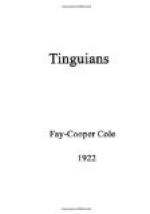Custom and religion have become so closely interwoven in this society that it is well-nigh impossible to separate them. The building of a house, the planting, harvesting and care of the rice, the procedure at a birth, wedding, or funeral, in short, all the events of the social and economic life, are so governed by custom and religious beliefs, that it is safe to say that nearly every act in the life of the Tinguian is directed or affected by these forces.
Two classes of spirits are recognized; first, those who have existed through all time, whom we shall call natural spirits; second, the spirits of deceased mortals. The latter reside forever in Maglawa, a place midway between earth and sky; but a small number of them have joined the company of the natural spirits. Except for these few, they are not worshiped, and no offerings are made to them, after the period of mourning is past. The members of the first class cover a wide range, from Kadaklan, the great spirit who resides above, to Kaboniyan, the teacher and helper, to those resident in the guardian stones, to the half human, half bird-like alan, to the low, mean spirits who delight to annoy mortals. These beings are usually invisible, but at times of ceremonies they enter the bodies of the mediums, possess them, and thus communicate with the people. On rare occasions they are visible in their own forms, as when Kaboniyan appeared as the antagonist and later as the friend of Sayen. [117]
These beings are addressed, first through certain semi-magical formulas, know as diams. These are seldom prayers or supplications, but are a part of a definite ritual, the whole of which is expected to gain definite favors.
At the beginning, and during the course of all ceremonies, animals are killed. A part of the flesh and the blood is mixed with rice, and is offered to the spirits; but the bulk of the offering is eaten by the participants. Liquor is consumed in great quantities at such a time, but a small amount is always poured out for the use of the superior beings. Finally, the mediums summon the spirits into their bodies; and, when possessed, they are no longer considered as persons, but are the spirits themselves. The beings who appear in this way talk directly with the people; they offer advice, give information concerning affairs in the spirit world, and oftentimes they mingle with the people on equal terms, joining in their dances and taking a lively interest in their daily affairs.
The people seldom pray to or supplicate the invisible spirits; but when they are present in the bodies of the mediums, they make requests, and ask advice, as they would from any friend or acquaintance. With many, the Tinguian is on amicable terms, while toward Kaboniyan he exhibits a degree of respect and gratitude which is close to affection. He realizes that there are many unfriendly spirits, but he has means of controlling or thwarting their evil designs; and hence he does not live in that state of perpetual fear which is so often pictured as the condition of the savage.




